Features - March 22, 2000
Psychology and the White House
Greenstein examines presidential leadership style
by Ann Waldron
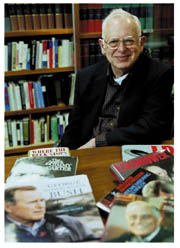 The Watergate scandal was erupting when Fred Greenstein
began his first semester as a politics professor in the Woodrow Wilson School.
An expert on politics and personality, Greenstein was fascinated by what
was happening to President Richard Nixon that fall of 1973. In his view,
Nixon had performed brilliantly his first term; now he was sinking.
The Watergate scandal was erupting when Fred Greenstein
began his first semester as a politics professor in the Woodrow Wilson School.
An expert on politics and personality, Greenstein was fascinated by what
was happening to President Richard Nixon that fall of 1973. In his view,
Nixon had performed brilliantly his first term; now he was sinking.
Inspired, Greenstein decided to turn his full scholarly attention to
the institution of the presidency of the United States. "Political
science was getting more statistical, and I could study the presidents to
find out what makes people in government tick," he said. "Presidents
were bigger than life. They were something I could dig into."
For 27 years he worked like an anthropologist, studying U.S. presidents
instead of primitive tribes. His hard-won knowledge has made him a recognized
authority on the presidency, not only well known among scholars but also
frequently quoted in the news media.
Now Greenstein's work has culminated in a soon-to-be published book,
The Presidential Difference: Leadership Style from FDR to Clinton (The Free
Press, 2000). The book analyzes those 11 presidents, briefly describing
each one's background, political style, and presidential conduct. Greenstein
then rates the performance of each in six categories: public communication,
organizational capacity, political skill, vision of public policy, cognitive
style, and emotional intelligence. By this last quality, Greenstein explains,
he means the ability to "manage one's emotions and turn them to constructive
purposes, rather than being dominated by them." According to Greenstein,
Nixon, the president who got him started on this quarter-century-long study,
was a man who could not manage his emotions, while presidents such as Truman,
Eisenhower, and Ford were free of emotional perturbations that would have
interfered with their leadership.
"I wanted to judge the means presidents have used, not the ends
they hoped to achieve," Greenstein said. "The book is about how
they handled the helm, not where they were piloting the ship to."
He began his intensive study of the presidents with Nixon, but went back
to Franklin Roosevelt because of his childhood fascination with FDR, who
he described as "a very important figure in our household." Continuing
chronologically, he looked closely at Harry Truman and then came to Dwight
Eisenhower-and there had to stop and correct the record. "I realized
what I had taught students about Eisenhower was untrue," he said. "Hitherto
unpublished papers in the Eisenhower Library showed that Eisenhower was
not at all the passive president that everyone had assumed. He was indeed
quite active."
Greenstein's revisionist book about Eisenhower, The Hidden Hand Presidency:
Eisenhower as Leader (Johns Hopkins, 1994), came out in 1982 and changed
the way historians viewed Eisenhower.
Only after this pause to reexamine Eisenhower did Greenstein return to
his study of all the presidents. He took a decade to write The Presidential
Difference. "It took years before the chapters began to jell,"
he said. "When I got further into it, I went back over the early chapters,
so they would all be parallel. I wanted to raise the argument about presidents
to a higher, more explicit level."
Greenstein, who is on leave this year before a final year of teaching,
plans to retire in 2001. He hopes that the book, a legacy of his years at
Princeton, will encourage people to judge political candidates by objective
standards and to think of the candidates' leadership potential.
Greenstein grew up in the New York City suburbs, consumed with an interest
in politics and journalism. He went to Antioch College and enrolled in its
five-year work-study program, where he alternately studied on campus for
three months and worked at newspaper and public relations jobs for three
months. During his freshman year in the fall of 1948, he was a copy boy
at the Chicago Sun-Times. "It was the paper that supported Truman,
and we had lots of copies of the famous Chicago Tribune front page with
the banner headline, 'Dewey Defeats Truman,' " he recalled.
His eventual entry into academia, he said, was quite accidental. "I
had been in the service, and I had access to the Korean GI Bill," he
said. "Small-town papers had lost their glamour, and I didn't want
to be a copy boy on a big-city newspaper. I was more interested in the irrational
parts of political life: What could happen to an industrial country like
Germany that would turn its leaders into war criminals? How could we regard
Russia as our ally during the war and our nemesis after the war?"
As an undergraduate Greenstein had read books by Yale professor Harold
Lasswell that explored the links between the political and the psychoanalytical.
Intrigued by Lasswell's theories, he applied to and was accepted by Yale
as a graduate student.
In Lasswell's seminar, Greenstein stumbled on a study of grade-school
children and their perception of politics. "How much did they know
about politics?" he said. "And when did they learn it? It seemed
to me that a study of children and politics would be a simple way of getting
at the ins and outs of how politics relates to psychology. Do children always
reflect the views of their parents? When do they stop and acquire their
own ideas? Do children from more educated homes know more about politics
than children from poorer homes? Are boys and girls different in the way
they regard politics?"
Greenstein had found his dissertation topic. He visited New Haven schools
and asked children to fill out a questionnaire. He discovered that children's
views of politics all revolved around the president of the United States,
although their understanding might be limited to, "He puts the money
in the banks and Daddy gets paid." "By the fourth grade they all
knew who was president," said Greenstein, adding that after Watergate,
children had less positive views of the president.
Greenstein's dissertation became a book, published by Yale University
Press in 1965. He later did a study of children in England, the U.S., and
France asking them what would happen in certain situations-for instance,
what they thought would happen if the Queen, the President, or DeGaulle
were stopped for speeding. "Children in England thought the policeman
would bow and scrape when he found out he had stopped the Queen," Greenstein
said. "American children thought the policeman would be less deferential.
The French children thought the gendarme would berate DeGaulle."
After he finished his Ph.D. at Yale, Greenstein moved on from studies
of children, but he still wanted to explore the interaction of psychology
and politics. He spent a year studying at the New York Psychoanalytic Institute
before turning to academia, teaching government at Wesleyan University.
He made his mark with the book Personality and Politics: Problems of Evidence,
Inference, and Conceptualization, which appeared in 1969. "It's very
dry and learned," he said. "It was an attempt to show students
of politics how to draw on the study of personality."
Greenstein's work on psychology-he was a founding member of the International
Society for the Study of Psychology and Politics in 1975-was immensely useful
in his study of the presidents, giving him perspective and objectivity.
Prepublication readers of The Presidential Difference have remarked that
it is impossible to tell who the author personally favored.
When asked which president he likes best, Greenstein replies that he
likes them all. "Some of them have had a sense of direction, and others
haven't," he said. At various times Greenstein has said what a towering
figure Roosevelt was in his childhood, and he admits that even over the
years, Roosevelt has remained "a true giant." Greenstein was also
fascinated with Nixon-that's clear-particularly with the way he opened up
relations to China and managed other colossal achievements, and then was
undone by a political scandal that could have been prevented.
And at first Greenstein was so taken with Clinton that he maneuvered
to get a copy of a C-Span tape of him talking to an African-American church
in Michigan. "I thought he was eloquent and full of political electricity,
with all the strong points of FDR, Kennedy, and Johnson," Greenstein
said. "It turned out he had all the weaknesses-a combination of Masters
and Johnson and Anna Karenina."
Ann Waldron is a freelance writer who lives in Princeton.
Service Without Borders
Alumni work around the world to relieve suffering
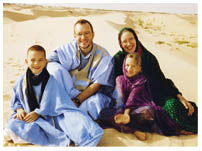
by Rob Garver
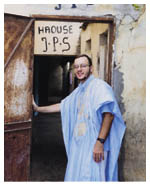 The morning of his first Christmas in Mauritania, Joseph Cumming '82
woke in a state of elation. He was fulfilling his long-held goal of delivering
humanitarian relief to the poor in Africa, and just hours before, he and
his companions-many of them fellow Princetonians-had celebrated a midnight
Christmas service in their new home.
The morning of his first Christmas in Mauritania, Joseph Cumming '82
woke in a state of elation. He was fulfilling his long-held goal of delivering
humanitarian relief to the poor in Africa, and just hours before, he and
his companions-many of them fellow Princetonians-had celebrated a midnight
Christmas service in their new home.
A knock on the door that morning did nothing to change his mood. A messenger
from the local prefect had arrived, asking Cumming if his group, Doulos
Community, would loan the prefect an automobile to transport a sick person
to a distant hospital. It seemed almost a sign that they were needed in
the west African city of Tijikja. Cumming went along with the messenger,
to tell the prefect in person that he was welcome to use one of their vehicles.
"By the way," he said to the prefect, after they had made the
arrangements, "I thought you might be interested to know that today
is one of the most important Christian feast days of the year."
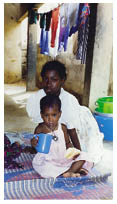 The prefect, a Muslim like the vast majority of his countrymen, looked
blankly at Cumming and said, "That's nice. Now, can you give us some
fuel?"
The prefect, a Muslim like the vast majority of his countrymen, looked
blankly at Cumming and said, "That's nice. Now, can you give us some
fuel?"
Cumming, whose Christian faith had led him to do relief work, found the
moment more than unsettling. "It was very painful for me," he
recalls in a pleasantly earnest voice. "It was December 25th and nobody
in the entire city was aware that it was any different from the 24th or
the 26th. It wasn't that they were ignoring it. They just didn't know anything
about Christmas."
In many different forms and in many different countries, Princetonians
who have dedicated all or part of their lives to relieving suffering among
the poor of the world report similar eye-opening incidents, moments when
idealism and naiveté butt up against hard reality.
For some, like Cumming, it comes in small ways, when they realize that
they have left their own culture so far behind that basic assumptions about
what is desirable, what is good, and even what is moral, are no longer shared
by those around them.
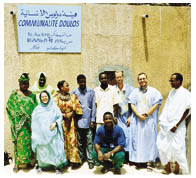 For others it is more harsh. It comes the first time they confront a
corrupt government that barters away the relief of its own people, trading
suffering for political or economic gain. Or it happens with their first
attempt to bargain with an opportunistic provider of food or supplies.
For others it is more harsh. It comes the first time they confront a
corrupt government that barters away the relief of its own people, trading
suffering for political or economic gain. Or it happens with their first
attempt to bargain with an opportunistic provider of food or supplies.
For those who fight past the disillusionment that relief work can engender,
the reward is an exhilaration, tempered by an understanding of the heights-and
the depths-that human behavior is capable of reaching.
Beyond Idealism
It takes a special type of person to succeed in relief work, one who
is not only idealistic and generous, but also practical, committed, and
energetic. George Elsey '39, who spent 20 years working for the Red Cross-12
of those as its president-and sent countless people on overseas assignments,
describes his best workers as "the kind of people who would respond
to their own communities. The sort of people who join the volunteer fire
department, or even give a beginners' swimming class-people with organizational
ability.
"When they went on overseas operations, they would typically find
a lot of local people milling around, not knowing quite what to do. We needed
people who could get supplies moving-who could get things off trucks and
then get them to the places where they needed to be."
Amanda High '88 knows about organizing. She is often among the first
relief workers to reach areas of famine or disaster. Currently working in
Africa for the Red Cross, High admits that battling with avaricious officials
or profiteering suppliers is a mental and emotional drain. But the reward,
she reminds herself, is a front-row seat for some of the most inspiring
examples of human courage.
"Although relief workers often appear to be somehow center stage
in the media portrayals of humanitarian interventions," she writes
via e-mail from Kenya, "it is not at all the case. What's happening
is that the affected population is regrouping-sometimes with single-mindedness,
sometimes apparently unconsciously. The lives of the beneficiaries, though
in flux and distressed, are ongoing and unfolding. The day-to-day activities
of those people, as they reorient themselves to a new environment, be it
a refugee camp, or a damaged home, or a changed conflict scenario, are center
stage. The heroic efforts of individuals, and communities as a whole, to
reestablish a sense of normalcy is what we 'humanitarians' watch . . . and
it most certainly is not the backdrop. It's the main feature."
High's first experience overseas was partially funded by Princeton. A
grant from the university helped her spend part of the summer following
her sophomore year in Sierra Leone, in West Africa. With a group of workers,
she helped to clear arable land for a village that would use the proceeds
from its cultivation to fund a clinic.
That summer's work confirmed High's desire to do relief work, and when
she graduated in 1988, she started looking for an organization that would
accept her. "It is very hard to get overseas for the first time,"
she says. Much more so, she adds, for a middle-class, female Ivy Leaguer.
"They were worried that I wouldn't be able to hack it," she says.
High worked in a bar for months while looking for her first job. She
had earned a certificate in teaching English as a foreign language while
at Princeton, and applied to a Boston-based organization that recruited
teachers. An employee of the organization told her about a school in Pakistan
that would be interested in her. The school itself wasn't a participant
in the placement agency's program, the woman told her, but it was run by
a friend of hers and was in need of another teacher.
High had studied religion while at Princeton, with a concentration on
Islam, and was intrigued by the possibility of going to a Muslim country.
She was also anxious to get overseas and begin working, so she took the
job.
High arrived in the city of Lahore to find herself working in a highly
evangelical mission school, where she was clearly unwelcome. She was locked
in her room at night ("for my own protection," she says wryly)
and was never allowed to be by herself with the students because the administrators
worried that "I would poison their minds" with stories of freedom
and license in America. "I later decided that they had wanted me there
because I was a woman and because I had the Princeton degree," High
says. "It would look good when they were writing grant applications."
Unable to boil her own water or prepare her own meals, High found herself
becoming sick, and when appeals to her employers/captors went unheard, she
began to feel desperate. One evening, shivering with fever, she decided
to leave. She crawled out the window of her room, stole her own passport
back from the school's offices, and escaped-literally over the wall-from
the mission.
In her pocket was the name and address of the brother of a former coworker
at the bar. She got herself on a plane to Islamabad and showed up on his
doorstep. He was in Pakistan working for a program supported by the U.S.
State Department, resettling political refugees to the U.S.
More formal roads
When she recovered, High found that not only had she escaped a bad job,
she had found a good one. She spent two and a half years working in the
resettlement program in Pakistan before returning for a short stint at the
United Nations. She then worked for the same program in Khartoum, returning
to the U.S. again to pursue a master's degree at Johns Hopkins School of
Advanced International Studies. When she completed her degree in 1995, she
joined the Red Cross, and has worked along the disputed border region between
Azerbaijan and Armenia, and throughout central Africa.
Today she works as regional relief delegate attached to the International
Federation of Red Cross and Red Crescent Societies. From Nairobi, Kenya,
she coordinates responses and organizes relief for a large segment of eastern
and central Africa.
Across the continent from High, Joseph Cumming-who rebounded from his
initial culture shock and has lived in Mauritania most of the past 17 years-and
Doulos Community operate a maternal and child health care center in the
city of Nouakchott. The Doulos operation in Nouakchott, which is managed
by Karen Boyle '85, provides health care services to about 20,000 people,
Cumming estimates. The group also runs rural development centers that focus
on agricultural programs, microcredit, women's cooperatives, and refugee
resettlement.
Doulos Community began at Princeton, when a group of students involved
in the Alpha-Omega Christian Fellowship, headed by then-campus minister
Ken Jasko '78, came together and decided to make a contribution to the poor
of the world. Other Princetonians involved in the founding of the program
were Chris Falter '83, Linda Francese Falter '84, Jerry Roth, formerly of
the Princeton geology department, and Steve Wilson, a graduate of Westminster
Choir College in Princeton.
The name of the group has its origin in the Greek word for servant, and
alludes to a passage in St. Paul's Letter to the Philippians that encourages
believers to renounce a life of privilege and comfort and to live with and
serve the poor. But despite its Christian origins, the group does not proselytize-mainly
because the Islamic Mauritanian government would never allow it.
Cumming and his companions content themselves with portraying a different
kind of Christianity from that which Islamic nations have typically experienced.
"What have Muslims traditionally experienced at the hands of Christianity?
Militarism, license, and oppression," he answers his own question.
"We hope that through what we do, they will see a kinder face of Christianity."
Moonlighting and making a difference
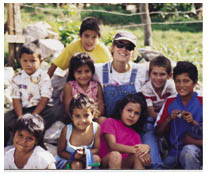 Not all Princetonians who do relief work live overseas year-round. Some
are able to balance a relatively normal life at home with their time abroad.
Not all Princetonians who do relief work live overseas year-round. Some
are able to balance a relatively normal life at home with their time abroad.
Katherine Hinckley '95 helped build a school in Thailand when she was
a teenager, and the experience sent her to Princeton with twin urges: to
travel further and to study other cultures. She found a way to satisfy both
in the religion department, which helped her study abroad as she progressed
toward her degree. As the years went on, though, simply studying other people
came to seem less satisfying. She wanted a way to connect with them.
"I craved a hands-on skill," she says. That led her to medical
school at the University of Pennsylvania, where she is currently in her
second year. She and her husband, McKay Jenkins *96, have carved time out
of her medical school schedule and his duties as a professor of journalism
at the University of Delaware to participate in overseas relief programs.
Last summer, the pair spent several weeks with Habitat for Humanity, building
homes in a Nicaraguan village.
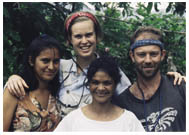 When they married, Jenkins and Hinckley promised each other that they
would "do this kind of thing often," says Jenkins. "That's
not to say we won't go to Paris if the opportunity arises," he adds.
But the experience of building homes with the poor of Nicaragua for weeks
at a time was more rewarding than any package tour. "It was enriching
and meaningful," he says. "By doing something like that you make
a much richer and deeper connection to the people than you can by walking
into town, having a meal, and leaving on the bus."
When they married, Jenkins and Hinckley promised each other that they
would "do this kind of thing often," says Jenkins. "That's
not to say we won't go to Paris if the opportunity arises," he adds.
But the experience of building homes with the poor of Nicaragua for weeks
at a time was more rewarding than any package tour. "It was enriching
and meaningful," he says. "By doing something like that you make
a much richer and deeper connection to the people than you can by walking
into town, having a meal, and leaving on the bus."
It was a bus, in fact, that took them from San Juan in Costa Rica, where
they began their journey, to Managua. "There are two kinds of buses
in Nicaragua," Jenkins says, "the kind with windows that open
and the kind that have air conditioning." At first, they were relieved
to see that they were getting on a more modern bus-the kind with air conditioning.
Until they discovered that the air conditioning didn't work, and then found
that the windows were sealed shut. "It was like spending 10 hours in
a sauna," he says.
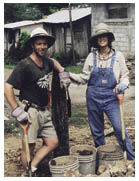 Jenkins, a professional journalist, has an eye for the small details
that illustrate the larger picture of life in the Nicaraguan countryside.
Walk past any American construction site, he says, and look on the ground.
All around you'll see bent nails, discarded by the builders who simply reached
into their bulging tool belts for cheap replacements. "There are no
bent nails on the ground in Nicaragua," he says. "If a carpenter
bends one, he picks it up, straightens it out and uses it again."
Jenkins, a professional journalist, has an eye for the small details
that illustrate the larger picture of life in the Nicaraguan countryside.
Walk past any American construction site, he says, and look on the ground.
All around you'll see bent nails, discarded by the builders who simply reached
into their bulging tool belts for cheap replacements. "There are no
bent nails on the ground in Nicaragua," he says. "If a carpenter
bends one, he picks it up, straightens it out and uses it again."
And workers' tool belts do not bulge. When he needed to cut the wires
holding a pallet of cement bags together, Jenkins pulled out his Leatherman-an
all-purpose pocket tool available in any American hardware store-and used
the wire cutter. "The Nicaraguan builders fell over themselves asking
me to give it to them," Jenkins remembers. In a town where the only
way to transport 100-pound bags of cement was for workers to carry them
on their backs, the wire cutter in his $30 glorified pocket knife was the
most modern tool around.
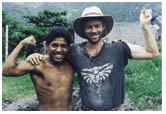 Next year, Jenkins and Hinckley are taking an intensive month-long course
taught by the Center for International Health and Cooperation. The 12-hour-a-day,
six-day-a-week program will simulate a humanitarian crisis, from which the
students will learn methods of dealing with government and military leaders,
coping with corrupt officials, and other skills necessary in the world of
relief work.
Next year, Jenkins and Hinckley are taking an intensive month-long course
taught by the Center for International Health and Cooperation. The 12-hour-a-day,
six-day-a-week program will simulate a humanitarian crisis, from which the
students will learn methods of dealing with government and military leaders,
coping with corrupt officials, and other skills necessary in the world of
relief work.
While Hinckley's skills as a physician will obviously be in demand among
relief agencies, Jenkins sees his role as that of the journalist: "What
I can contribute, hopefully, will be as a writer," he says. With several
book proposals in the works that blend his interests in environmental issues
and relief work, Jenkins is clear in his purpose. "I'm going into this
as both a writer and a worker."
On the front lines
Another Princetonian who tries to balance a life in the States with a
life in relief work is surgeon Josephine Tsai '88. Currently on a surgery
fellowship at the University of Southern California, her life could be mistaken
for that of thousands of other young doctors. But as a volunteer surgeon
for Doctors Without Borders (also known as Médecins sans Frontières),
the Paris-based group that recently won the Nobel Peace Prize for its work
in some of the most dangerous spots in the world, her life has been anything
but normal.
Tsai's first assignment for the organization was a two-month posting
to Sri Lanka. On the border between areas held by the Indian government
in the south and rebel Tamil soldiers in the north, the area was surprisingly
calm, she says, admitting to a little bit of professional disappointment.
Aside from a few operations performed while nurses held flashlights over
the incision, the challenges were primarily in the area of sanitation.
Her second assignment, a five-month posting to Burundi, was more challenging,
both professionally and personally. In a town that was the center of constant
small skirmishes and two major attacks during the ongoing civil war between
the Hutu and Tutsi ethnic groups, she was the only surgeon in a clinic that
treated hundreds of victims of vicious sectarian violence.
The wounded she dealt with were mainly women, children, and the elderly,
who were singled out as "witnesses" by the rebels. Frequently,
the machete and bullet wounds she treated were inflicted specifically to
maim and disfigure, and not to kill.
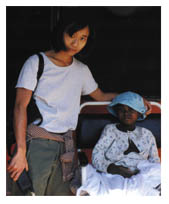 A typical case, she remembers, was a woman who was shot in the hand
and in the face. "She hid under a corpse for three days before it was
safe for her to come out," Tsai recalls. By the time she arrived at
the clinic, gangrene had set in and the hand had to be amputated.
A typical case, she remembers, was a woman who was shot in the hand
and in the face. "She hid under a corpse for three days before it was
safe for her to come out," Tsai recalls. By the time she arrived at
the clinic, gangrene had set in and the hand had to be amputated.
"When I first arrived, I was disillusioned about the motivations
of the people I was working with," Tsai says. "Nurses would stand
chatting among themselves as trauma cases rolled into the clinic. It was
as though their ethics were very different from mine."
Part of the problem, she learned, was a lack of training. When she was
able to impart certain skills, she found the local nurses more than willing
to apply them. She also discovered that their personal motivations went
much deeper than she had understood. These women, she realized, had to walk
to work, day and night, through the same streets in which killings were
taking place every day, putting their own lives at risk for the pennies
per day that Burundi's government paid them.
In February 1999, Tsai's village was the focus of a major attack by rebel
forces. The marketplace, which was the center of the assault, was only a
hundred yards from the clinic. She performed between 30 and 40 operations
in a few days.
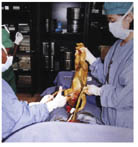 The aftermath brought a four-day stream of wounded through her hospital,
but one of the operations that left her most affected was performed on a
dead woman. The victim, who was pregnant, was attacked with a machete and
left eviscerated in the marketplace. Her family brought the body to Tsai,
asking her to perform a Cesarean section, so that mother and child could
be buried separately. She did it for them.
The aftermath brought a four-day stream of wounded through her hospital,
but one of the operations that left her most affected was performed on a
dead woman. The victim, who was pregnant, was attacked with a machete and
left eviscerated in the marketplace. Her family brought the body to Tsai,
asking her to perform a Cesarean section, so that mother and child could
be buried separately. She did it for them.
A few months before that assault, on Christmas Day in 1998, Tsai attended
Mass at the local Catholic church. The town was very tense, expecting an
escalation in the violence soon, but in the church Tsai found people celebrating
Christmas with an elaborate service, complete with a full choir and decorations.
"It was really beautiful," she says. "I think they needed
it."
Rob Garver is a journalist working in Washington, D.C.
GO TO
the Table of Contents of the current issue
GO TO
PAW's home page
paw@princeton.edu
 The Watergate scandal was erupting when Fred Greenstein
began his first semester as a politics professor in the Woodrow Wilson School.
An expert on politics and personality, Greenstein was fascinated by what
was happening to President Richard Nixon that fall of 1973. In his view,
Nixon had performed brilliantly his first term; now he was sinking.
The Watergate scandal was erupting when Fred Greenstein
began his first semester as a politics professor in the Woodrow Wilson School.
An expert on politics and personality, Greenstein was fascinated by what
was happening to President Richard Nixon that fall of 1973. In his view,
Nixon had performed brilliantly his first term; now he was sinking.
 The morning of his first Christmas in Mauritania, Joseph Cumming '82
woke in a state of elation. He was fulfilling his long-held goal of delivering
humanitarian relief to the poor in Africa, and just hours before, he and
his companions-many of them fellow Princetonians-had celebrated a midnight
Christmas service in their new home.
The morning of his first Christmas in Mauritania, Joseph Cumming '82
woke in a state of elation. He was fulfilling his long-held goal of delivering
humanitarian relief to the poor in Africa, and just hours before, he and
his companions-many of them fellow Princetonians-had celebrated a midnight
Christmas service in their new home. The prefect, a Muslim like the vast majority of his countrymen, looked
blankly at Cumming and said, "That's nice. Now, can you give us some
fuel?"
The prefect, a Muslim like the vast majority of his countrymen, looked
blankly at Cumming and said, "That's nice. Now, can you give us some
fuel?" For others it is more harsh. It comes the first time they confront a
corrupt government that barters away the relief of its own people, trading
suffering for political or economic gain. Or it happens with their first
attempt to bargain with an opportunistic provider of food or supplies.
For others it is more harsh. It comes the first time they confront a
corrupt government that barters away the relief of its own people, trading
suffering for political or economic gain. Or it happens with their first
attempt to bargain with an opportunistic provider of food or supplies. Not all Princetonians who do relief work live overseas year-round. Some
are able to balance a relatively normal life at home with their time abroad.
Not all Princetonians who do relief work live overseas year-round. Some
are able to balance a relatively normal life at home with their time abroad. When they married, Jenkins and Hinckley promised each other that they
would "do this kind of thing often," says Jenkins. "That's
not to say we won't go to Paris if the opportunity arises," he adds.
But the experience of building homes with the poor of Nicaragua for weeks
at a time was more rewarding than any package tour. "It was enriching
and meaningful," he says. "By doing something like that you make
a much richer and deeper connection to the people than you can by walking
into town, having a meal, and leaving on the bus."
When they married, Jenkins and Hinckley promised each other that they
would "do this kind of thing often," says Jenkins. "That's
not to say we won't go to Paris if the opportunity arises," he adds.
But the experience of building homes with the poor of Nicaragua for weeks
at a time was more rewarding than any package tour. "It was enriching
and meaningful," he says. "By doing something like that you make
a much richer and deeper connection to the people than you can by walking
into town, having a meal, and leaving on the bus." Jenkins, a professional journalist, has an eye for the small details
that illustrate the larger picture of life in the Nicaraguan countryside.
Walk past any American construction site, he says, and look on the ground.
All around you'll see bent nails, discarded by the builders who simply reached
into their bulging tool belts for cheap replacements. "There are no
bent nails on the ground in Nicaragua," he says. "If a carpenter
bends one, he picks it up, straightens it out and uses it again."
Jenkins, a professional journalist, has an eye for the small details
that illustrate the larger picture of life in the Nicaraguan countryside.
Walk past any American construction site, he says, and look on the ground.
All around you'll see bent nails, discarded by the builders who simply reached
into their bulging tool belts for cheap replacements. "There are no
bent nails on the ground in Nicaragua," he says. "If a carpenter
bends one, he picks it up, straightens it out and uses it again." Next year, Jenkins and Hinckley are taking an intensive month-long course
taught by the Center for International Health and Cooperation. The 12-hour-a-day,
six-day-a-week program will simulate a humanitarian crisis, from which the
students will learn methods of dealing with government and military leaders,
coping with corrupt officials, and other skills necessary in the world of
relief work.
Next year, Jenkins and Hinckley are taking an intensive month-long course
taught by the Center for International Health and Cooperation. The 12-hour-a-day,
six-day-a-week program will simulate a humanitarian crisis, from which the
students will learn methods of dealing with government and military leaders,
coping with corrupt officials, and other skills necessary in the world of
relief work. A typical case, she remembers, was a woman who was shot in the hand
and in the face. "She hid under a corpse for three days before it was
safe for her to come out," Tsai recalls. By the time she arrived at
the clinic, gangrene had set in and the hand had to be amputated.
A typical case, she remembers, was a woman who was shot in the hand
and in the face. "She hid under a corpse for three days before it was
safe for her to come out," Tsai recalls. By the time she arrived at
the clinic, gangrene had set in and the hand had to be amputated. The aftermath brought a four-day stream of wounded through her hospital,
but one of the operations that left her most affected was performed on a
dead woman. The victim, who was pregnant, was attacked with a machete and
left eviscerated in the marketplace. Her family brought the body to Tsai,
asking her to perform a Cesarean section, so that mother and child could
be buried separately. She did it for them.
The aftermath brought a four-day stream of wounded through her hospital,
but one of the operations that left her most affected was performed on a
dead woman. The victim, who was pregnant, was attacked with a machete and
left eviscerated in the marketplace. Her family brought the body to Tsai,
asking her to perform a Cesarean section, so that mother and child could
be buried separately. She did it for them.